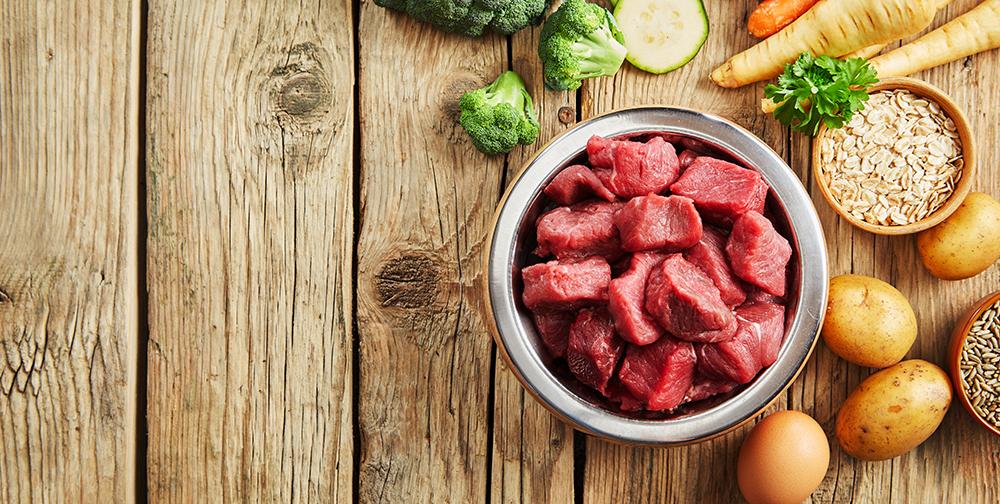Keep his teeth and gums in tiptop condition with the top 10 dental health foods and supplements for dogs and cats.
Dogs and cats are as prone to dental problems as we are. Oral health needs to be part of every animal’s wellness regimen, and includes veterinary checkups, regular home brushing, and a proper diet. This article focuses on the best dental health foods for dogs
and cats.
1. Bee propolis
Also known as “bee glue,” bee propolis has so much to offer. Studies have shown it has a variety of applications in veterinary medicine. Its antibacterial and anti-inflammatory properties make it an excellent alternative remedy for infected gums and sores in your dog or cat’s mouth. Use one drop per pound of body weight.
2. Bones (raw)
Cooked bones spell “danger” to our dogs and cats, but raw meaty bones provide the calcium necessary for building strong teeth. They’re also great for cleaning the teeth, helping to prevent the tartar formation that leads to gum inflammation.
Raw bones also contain probiotic bacteria and enzymes that support healthy bacterial flora in the mouth. These help fight harmful bacteria, like Streptococci actinomyces.
Choose organic marrow bones and knuckle bones for dogs (it’s a good idea to supervise your dog while he’s chewing on a bone). Organic chicken necks and backs are perfect for cats.
3. Coconut oil
Coconut oil is rich in lauric and caprylic acids. These medium-chain fatty acids have antibacterial, antiviral, antifungal, and antimicrobial properties. Lauric acid makes up almost 50% of coconut oil. For teeth cleaning, choose organic, virgin coconut oil.
Simply add a few drops to a pet toothbrush, or use a cotton make-up remover pad, gauze pad or Q-tip.
4. Coenzyme Q10
This powerful antioxidant supports heart health. It also helps keep gums healthy. Consider adding a CoQ10 supplement to your dog or cat’s diet. It’s best absorbed in oil – e.g. organic first pressed olive oil.
The suggested dose is 0.25 mg to 1 mg per pound body weight. Check with your vet before adding this supplement to your dog or cat’s diet plan.
5. Cranberries
Studies show that pure cranberry juice may work against cavities. It is also effective for bladder infections. Cranberries contain flavonoids, phenolic acids, anthocyanins, condensed tannins, and other compounds.
Researchers from the University of Rochester School of Medicine and Dentistry and New York’s Rutgers University found that many special substances in cranberries inhibit the enzymes associated with dental plaque formation. They can also stop bacteria from sticking to surfaces.
These compounds also prevent acid formation and reduce the acid tolerance of the bacteria that cause tooth decay.
6. Fennel
Fennel is a close relative of parsley, carrots, dill, and coriander, all of which have beneficial dental properties. Fennel’s phytonutrients include flavonoids like rutin, quercetin and kaempferol glycosides. It is packed with vitamin C, has anti-inflammatory properties, and will help freshen your animal’s breath and fight gingivitis.
Cooked fennel can be added to your dog or cat’s diet plan or try fennel seed tea by steeping one teaspoon of fennel seeds in eight ounces of boiling water (be sure to cool completely before serving). Glycerine fennel tinctures are also available.
7. Grapefruit seed extract
One of nature’s antiseptics, grapefruit seed extract (GSE) can be used both topically and internally.
Immunologist Dr. Jacob Harich popularized it in the 1970s. He was searching for a natural, non-toxic alternative to antibiotics that helps the body resist bacteria, viruses, parasites, and fungi. He found what he was looking for in the seeds and connecting tissue of the grapefruit.
SE exhibits significant antimicrobial activity at low concentrations, so always dilute it before using it — place one to six drops in five ounces of water, then use a Q-tip or gauze-covered finger to gently clean your animal’s teeth and gums.
8. Parsley (curly)
One of the world’s most concentrated food sources, parsley has antimicrobial and anti-inflammatory properties. It also includes lots of vitamin K and chlorophyll, making it a perfect breath freshener. When mixed into your dog or cat’s food, parsley tea provides most of what the dried or fresh herb offers.
Making parsley tea is very easy. Place ¼ cup fresh parsley or 2 tablespoons dried parsley in a small bowl and add 1 cup boiling water. Steep for 10 to 15 minutes. Strain, cool and serve. For dogs, consider adding 1 teaspoon per ten pounds body weight to meals; for cats, try 1 teaspoon per day, added to drinking water.
9. Sage
Sage has a long history, going all the way back to the ancient Romans, and was very popular in early medicine. Powdered sage leaves were sprinkled on food, just like pepper.
This herb provides vitamins A, E, and K. It also contains a variety of trace minerals, including calcium, magnesium, potassium, phosphorus, and zinc. It has antiseptic, antibacterial, antimicrobial, and astringent properties. This makes it another herb to consider for your dog or cat’s oral care.
It can be given as a tea. Alternatively, you can mix the fresh or dried leaves with water to create a paste that can be rubbed on your animal’s gums.
10. Wild strawberry
Wild strawberry (Frageria vesca) has a colorful history and has long been revered for its healing properties. The fruit’s acid cleans the teeth. Meanwhile, the seeds act as an abrasive. Wild strawberries can be mashed into a paste and used to remove tartar and clean teeth.
Frageria vesca also comes in the form of a homeopathic remedy (6C) that can help prevent tartar buildup on your dog or cat’s teeth. It softens the tartar, allowing you to remove it with a soft toothbrush.
Administer 1/2 to 1 dropperful once a week. Alternatively, add 20 drops to a water dish each week. Results should be seen within one month. Be sure to check with your vet before trying any homeopathic remedy.
You need a multi-faceted approach to maintain good dental health in your animal, with diet playing a big role. These dental health foods for dogs and cats can take his oral wellness to the next level by helping to keep his teeth and gums strong and healthy.
Recipes
The following recipes incorporate some of the dental-supportive foods and herbs highlighted in the article. Use organic ingredients whenever possible.
Cran-Crisp
Ingredients
- 2 cups whole grain flour of your choice (e.g. oat, which supports strong teeth, spelt, or Red Fife)
- 1 can wild salmon (or try “pole and line” tuna, mackerel, or sardines)
- ¼ cup pure cranberry juice
- ¼ cup filtered water
- 1 teaspoon sea salt (optional)
- 2 tablespoons fresh catnip or 1 tablespoon dried catnip for cats and 2 tablespoons fresh oregano and curly parsley, or 1 tablespoon dried, for dogs
- ¼ cup finely chopped fresh cranberries or sun-dried unsulfured cranberries
Instructions
Preheat oven to 325°F. Combine all ingredients in a food processor or blender, until thoroughly combined and the dough pulls away from the side of the bowl.
Turn dough out on a clean, lightly floured surface and divide into six balls. Knead each ball, then roll each into a circle about ¼” in thickness. Alternatively, you can roll out the dough and cut it into any shapes you like. Sprinkle flour on the rolling surface, and the rolling pin, as needed.
Place the rounds on a cookie sheet lined with parchment paper. Score the surface of each round with a knife or pizza slicer.
Bake for 20 minutes, then turn your oven down to 175°F and bake for another 30 minutes. Turn your oven off and let the rounds cool completely before gently breaking them into scored pieces and storing them in an airtight container or Ziploc bag.
Minty Mouth Spritz for Dogs
Ingredients
- 10 drops grapefruit seed extract
- 6 drops peppermint (Menta Piperita) essential oil (Important: only use essential oil labeled for culinary use!)
- ¼ teaspoon Ceylon Cinnamon
- 7 ounces filtered water
Instructions
Combine ingredients in a dark glass or opaque spray bottle. Shake well before use. Spritz in your dog’s mouth up to four times each day – three to five short pumps are all you need!
Don’t be surprized if your dog smacks his lips after a “spritz!” Store in the refrigerator.
Award-Winning Dental Delights
Ingredients
- 2 cups cooked chicken giblets (hearts, liver, gizzards)
- 1 tablespoon dried oregano
- 1 tablespoon fresh parsley
- 1 tablespoon cold pressed olive oil or hemp oil (for a twist, you can even try cranberry or blueberry oil)
- 1 whole egg
- 1½ cups stone ground whole grain flour (e.g. oat, spelt, or alternative flours like hemp or quinoa)
- ¼ cup cranberry essence or finely-minced sun-dried unsulfured cranberries
- 1 egg white parmesan cheese
Instructions
Place chicken giblets in a medium-sized pot and cover with filtered water. Bring water to a boil, skim the particulates from the surface, then turn down to simmer for 20 minutes.
Preheat oven to 350ºF. Cover two cookie sheets with parchment paper for easy clean-up. In a food processor or blender, combine all ingredients except the flour. Blend until you have a thick paste, then add the flour slowly, so it’s well incorporated. Add a bit more oil or filtered water if your dough is too dry, or a bit more flour if it’s too wet.
Dust your hands with flour and sprinkle it on a board or countertop. You can use oatmeal in place of flour. Knead the dough well, then roll it out to ¼” thickness on a sheet of floured wax paper or parchment paper.
Cut the dough into desired shapes and sizes; or take small pieces of dough, roll out to the thickness of a pencil, and cut into small treats like mini biscotti.
Bake for 30 minutes. Turn the oven down to 200ºF and remove the cookie sheets from the oven. Beat or whisk the egg white until soft peaks begin to form. Baste the biscuits with the egg white, then liberally sprinkle with Parmesan cheese.
Return the biscuits to the oven and bake for another 45 minutes. Turn the oven off and leave the biscuits until they are completely cool.
This recipe yields more than 50 medium-sized biscuits. It can easily be doubled. They store well in the refrigerator and also freeze well.
Note: It has been over two decades since I first created this recipe and entered it in a magazine contest. It then went on to appear in a veterinary text with the following comments:
“It is possible, believe it or not, to prevent, or, at the least, slow down gum erosion with a hard type of biscuit that contains antibacterial herbs known to prevent the occurrence of infection.”

